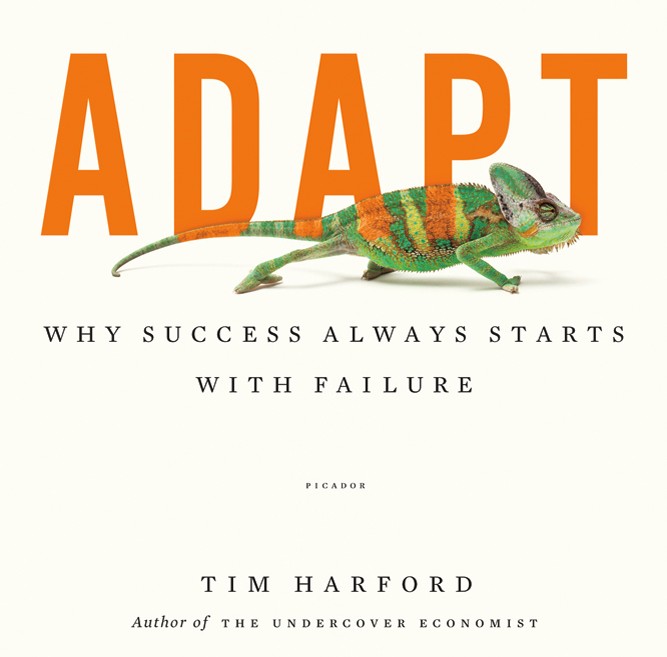As much as one can, I’m beginning to fall in love with economists. In this obnoxious political climate, it’s refreshing to hear arguments brought forward through actual objective facts that don’t pander to either political party. Tim Hartford has done a masterful job of this in Adapt: Why Success Always Starts with Failure.
Tim begins his book by sharing fascinating stories and research about the Iraq war, climate change, charity, the recent financial meltdown, and many other things. He lists the tremendous amount of failures that occurred prior to (relative) success on many world changing innovations. He also looks at Google, a company known for its constant innovation, which has an extremely high product failure rate. They try so many different things that a small percentage will always be successful, and this is the approach he argues we should all take within business and our lives.
Particularly, there are three main principles that Hartford argues for in his book:
- Try new things, expect that some will fail. This approach to me is far less intimidating than trying to come up with the best idea ever immediately. Being willing to be wrong will enable you to learn more with each mistake.
- Make failures survivable, create safe spaces for failure or move forward in small steps. This is a critical component, making failure disastrous is not a wise or courageous approach. You need to enable yourself to fail without losing everything for obvious reasons.
- Make sure you know when you’ve failed, or you will never learn. The purpose of failing is to learn from your mistakes and get closer to your goal on the next try. Also, it is important to cut the cord at the right time so that you don’t waste your time or money on a lost cause simply to deny the fact that you have failed.
One metaphor which came to mind for trying new things is the band that Derek, Co-founder of Marketplace Partner, and I are in. This band is an original jam band, and we’ll spend hours playing improv in order to find 20 good seconds we can use. To some (ok most), listening to the other parts of jams that are not up to par might be considered a failure, but the joy is in discovering those parts that turn out great. To sit down and write a song from scratch in one sitting has never worked out very well for me, it typically takes a lot more trial and error than that. This is not unlike developing business strategies.
For those of us that aren’t running out trying to find things to fail at, perhaps private failure is a good way to start. I’ve started the process of beginning over 10 businesses in my life and most of them were failures before many people had heard of them. This makes the failure far less toxic to deal with as you’re trying to allow yourself to be a person that accepts you can be wrong. I have had to shut down one particular company though that I am still years later regularly asked about. It’s still painful to explain that we shut it down because it didn’t work out. So this book has helped me feel some sense of pride in my spectacular and numerous failures over the years, and it will help you too.
In conclusion, I’ll quote a profound line from the final chapter, which sums up his argument brilliantly: “The process of correcting the mistakes can be more liberating than the mistakes themselves are crushing.” Those too prideful to put themselves out there can take a backseat to those of us willing to put our egos on the line, and that’s a great thing for us today, and a bad thing for the incumbent tomorrow.




